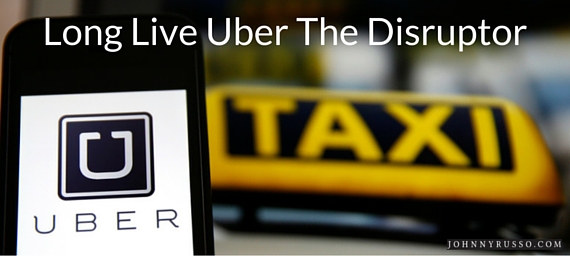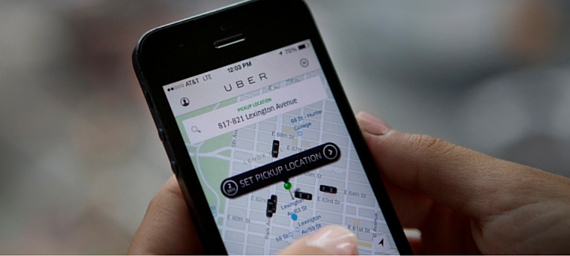Here’s the scene. It’s the year 2000. Imagine being Sears a company founded in 1886, a company that led the retail industry for over a century, an icon that was copied, yet never matched. Then an upstart comes along with a technology platform that will change retail forever, as Amazon has done. Well imagine if the government had intervened to stop Amazon and protect Sears, imagine that Sears’ employees threw eggs at Amazon offices, imagine if the government laid out a technology plan to have Sears get up to par with Amazon, but the technology would only be ready in a few years.
While Amazon has had many issues with the government, and numerous court dates dealing with taxes and book publishing licensing issues, it has thrived and completely altered the retail landscape. Amazon disrupted retail like Sears did 100 years earlier.
Uber is Killing it
Now enter 2015, where Uber a popular ride-sharing service that is revolutionizing (killing?) the taxi industry as we know it, and we have the government stepping in to curtail its use. We have the government trying to stop innovation from happening. We have the government not adapting quickly enough to a changing technology and preference landscape. And we have taxi associations crying foul and hiding behind government support, spending more time fighting with paperwork as the weapon, rather than innovation.
In particular, Montreal, Toronto, and Ottawa, have had several anti-Uber demonstrations, for the most part backed by the government. The main arguments are as follows: taxi drivers pay exorbitant taxi license fees (Montreal’s is over $200k); Uber drivers are neither licensed, nor insured; Uber is not paying taxes; and Uber drivers are not declaring taxes, even though many of them earn less than the $30k per year required to need a tax number.
Government Crying Foul Over Uber
So taxi drivers, rather than cry foul that the taxi associations and/or government are still charging these insane and outrageous licensing fees to make a living, turn to anger against Uber drivers. There have been many instances of taxi drivers blocking roads, being violent or verbally abusive to Uber drivers and passengers, and yes, there has even been childish egg throwing at Uber cars.
And after months of deliberation, Montreal Mayor Denis Coderre still declares Uber to be operating illegally. The city has almost 10 employees on the lookout for “illegal” Uber cars, and apparently, there have been a number of Uber cars seized.
Taxis Have Not Evolved
For anyone that has driven in taxis, you know the experience is not something to write home about: they smell of smoke; the driver rarely says hello and is usually pre-occupied on the phone; the taxi seats are in terrible shape; they seem to take the long road over and over again; and then when you want to pay by credit card, the taxi driver says he does not have a machine, or my favourite, the “machine’s battery has run out.”
The taxi industry has itself to blame. For the most part, they did not embrace GPS-location services or apps. They did not mandate electronic payments. Unless it was a trip to or from the airport, taxi drivers were never enthused to drive you, especially if the fare was going to be less than $15. I have been in many cabs where I never said one word to the driver, as they were on their phone the entire time. How’s that for customer experience.
Montreal to Put New Measures in Place to Uber-Itself
So the Montreal government has now laid out measures to force the local taxi industry to get in the game. Here’s the plan:
- All taxis will now be required to accept electronic payment
- Cabs will be installed with cameras for security purposes
- All taxi vehicles will look the same (quite possibly similar to New York’s famous yellow cabs)
- Panic buttons will be installed in all taxis
- And there will be a dress code for all drivers.
There is also talk of Uber-like apps and GPS-location services. Oh, and this should all be completed by the end of 2016. By that time, Uber, which was founded in San Francisco in 2009 and expanded internationally in 2012, will likely be 10 times larger in terms of drivers and usage than it is now.
Huge Taxi License Fee is Irresponsible
So rather than mandating that taxi associations eliminate the reckless $200k price tag to drive a “licensed taxi,” they will try and compete or replicate with Uber. Rather than have Uber present their roadmap to taxi drivers, and use their technology, the government will try to stop innovation. After all, Uber is a technology company. They are a disruptor. They have made it uncomfortable for an industry that has had little to no change for decades. And Uber is not perfect. Uber has many detractors and is still working on its customer experience.
But here is why I’m upset: because this sends the wrong message. Listen, my great uncle was a taxi driver, so I can understand their complaints and empathize with them. Disruption is never comfortable, especially when it involves your livelihood. But here’s the wrong message that the Quebec and Ontario governments and all the other legislations being enforced against Uber are sending: it tells your citizens to not think about innovation, to not disrupt the status quo, to not accept change, to focus on yesterday, rather than tomorrow.
Don’t Shoot The Innovator
Professor and author Clayton Christensen once said “Empowering innovations transform complicated, costly products that previously had been available only to a few people, into simpler, cheaper products available to many. Empowering innovations create jobs for people who build, distribute, sell and service these products.” Uber has done just that. And yes, while they must figure out what taxes to pay, how to insure their drivers and riders, and what security features they maintain, Uber has made it cheaper (fares are cheaper than taxis and the fare estimates are quite accurate); timely (you rarely have to wait more than a few mins for an Uber ride, and with their app, you know exactly how far your driver is); cooler (the fact they’re a tech company instantly makes them cool); and warmer (drivers are usually quite sociable, hospitable, and their cars are relatively new and in good shape). So what’s not to like?
I wish that governments would not penalize Uber, but try to work with them. And I they would eliminate the ancient and exorbitant license fees. They may have made sense a long time ago, but no longer. If they are not eliminated, they spell the end for taxis as we know it. Long live Uber.
What are your thoughts? Do you side with Uber and Uber drivers or with the taxi drivers, associations, and governments fighting against them?





Leave a Reply